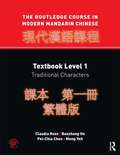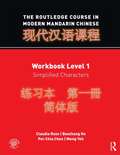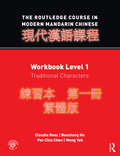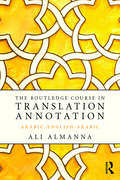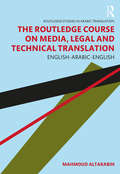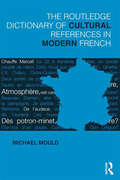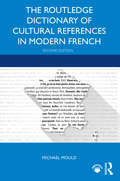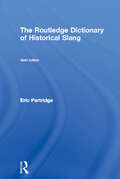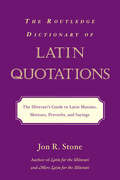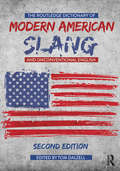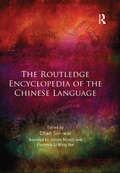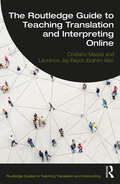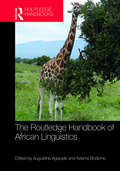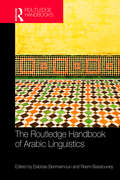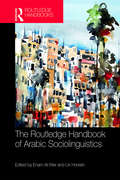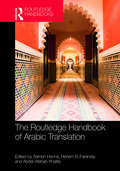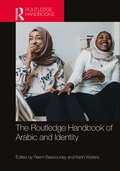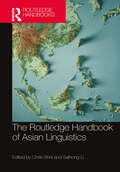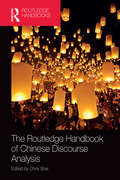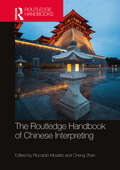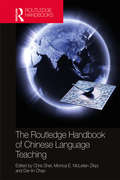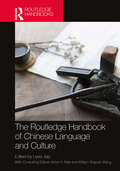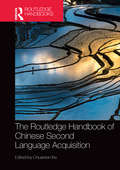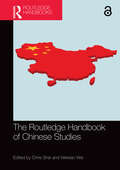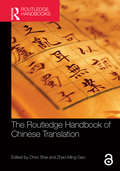- Table View
- List View
The Routledge Course in Modern Mandarin Chinese: Textbook Level 1, Traditional Characters
by Claudia Ross Baozhang He Pei-Chia Chen Meng YehThe Routledge Course in Modern Mandarin Chinese is a two-year undergraduate course for students with no prior background in Chinese study which takes students from complete beginner to post-intermediate level. Designed to build a strong foundation in both the spoken and written language it develops all the basic skills such as pronunciation, character writing, word use and structures, while placing strong emphasis on the development of communicative skills. Each level of the course consists of a textbook and workbook, available separately in simplified or traditional character editions. Both workbooks include a free CD with all the dialogues from the textbooks and the necessary audio for the listening for information exercises. A companion website will provide expanded listening files and a broad range of resources for students and teachers. The benefits of this course include: -focus on the long-term retention of vocabulary, characters and structures by reiterating structures and vocabulary throughout the book series -carefully selected and staged introduction of characters with staged removal of pinyin to ensure recognition and use of characters -clear and jargon-free explanations of use and structures, that are easy for students and teachers to understand -extensive workbook exercises for homework, independent study, and classroom use focusing on all language skills and modalities including a vast inventory of carefully structured exercises focusing on listening comprehension, reading for information, and writing for communication - an extensive inventory of classroom activities that guide students to develop communication-based speaking and listening skills. -a list of communication goals and key structures for each lesson allowing the student to assess progress -cultural notes explaining the context of the dialogues - language FAQs explaining aspects of Chinese language as they relate to the content and vocabulary in the lesson -storyline following a group of students studying in China from Europe, North America and East Asia, making the book attractive to a variety of students and facilitating the introduction of Chinese culture. -full-color text design for the textbook and carefully matched designs for the traditional and simplified books, allowing for easy cross-reference The course is also fully supported by an interactive companion website. The website contains a wealth of additional resources for both teachers and students. Teachers will find lesson plans in both English and Mandarin, providing a weekly schedule and overall syllabus for fall and spring, as well as activities for each lesson and answer keys. Students will be able to access downloadable character practice worksheets along with interactive pronunciation, vocabulary and character practice exercises. All the audio material necessary for the course is also available onliine and conveniently linked on screen to the relevant exercises for ease-of-use. For further details please visit http://www.routledge.com/books/details/9780415472517/ For bundle discounts please visit http://www.routledge.com/books/details/9780415596862/
The Routledge Course in Modern Mandarin Chinese: Workbook Level 1, Simplified Characters
by Claudia Ross Baozhang He Pei-Chia Chen Meng YehThe Routledge Course in Modern Mandarin Chinese is a two-year undergraduate course for students with no prior background in Chinese study which takes students from complete beginner to post-intermediate level. Designed to build a strong foundation in both the spoken and written language it develops all the basic skills such as pronunciation, character writing, word use and structures, while placing strong emphasis on the development of communicative skills. Each level of the course consists of a textbook and workbook, available separately in simplified or traditional character editions. Both workbooks include a free CD with all the dialogues from the textbooks and the necessary audio for the listening for information exercises. A companion website will provide expanded listening files and a broad range of resources for students and teachers. The benefits of this course include: -focus on the long-term retention of vocabulary, characters and structures by reiterating structures and vocabulary throughout the book series -carefully selected and staged introduction of characters with staged removal of pinyin to ensure recognition and use of characters -clear and jargon-free explanations of use and structures, that are easy for students and teachers to understand -extensive workbook exercises for homework, independent study, and classroom use focusing on all language skills and modalities including a vast inventory of carefully structured exercises focusing on listening comprehension, reading for information, and writing for communication - an extensive inventory of classroom activities that guide students to develop communication-based speaking and listening skills. -a list of communication goals and key structures for each lesson allowing the student to assess progress -cultural notes explaining the context of the dialogues - language FAQs explaining aspects of Chinese language as they relate to the content and vocabulary in the lesson -storyline following a group of students studying in China from Europe, North America and East Asia, making the book attractive to a variety of students and facilitating the introduction of Chinese culture. -full-color text design for the textbook and carefully matched designs for the traditional and simplified books, allowing for easy cross-reference The course is also fully supported by an interactive companion website. The website contains a wealth of additional resources for both teachers and students. Teachers will find lesson plans in both English and Mandarin, providing a weekly schedule and overall syllabus for fall and spring, as well as activities for each lesson and answer keys. Students will be able to access downloadable character practice worksheets along with interactive pronunciation, vocabulary and character practice exercises. All the audio material necessary for the course is also available online and conveniently linked on screen to the relevant exercises for ease-of-use. For further details please visit http://www.routledge.com/books/details/9780415472517/ For bundle discounts please visit http://www.routledge.com/books/details/9780415596824/
The Routledge Course in Modern Mandarin Chinese: Workbook Level 1, Traditional Characters
by Claudia Ross Baozhang He Pei-Chia Chen Meng YehThe Routledge Course in Modern Mandarin Chinese is a two-year undergraduate course for students with no prior background in Chinese study which takes students from complete beginner to post-intermediate level. Designed to build a strong foundation in both the spoken and written language it develops all the basic skills such as pronunciation, character writing, word use and structures, while placing strong emphasis on the development of communicative skills. Each level of the course consists of a textbook and workbook, available separately in simplified or traditional character editions. Both workbooks include a free CD with all the dialogues from the textbooks and the necessary audio for the listening for information exercises. A companion website will provide expanded listening files and a broad range of resources for students and teachers. The benefits of this course include: -focus on the long-term retention of vocabulary, characters and structures by reiterating structures and vocabulary throughout the book series -carefully selected and staged introduction of characters with staged removal of pinyin to ensure recognition and use of characters -clear and jargon-free explanations of use and structures, that are easy for students and teachers to understand -extensive workbook exercises for homework, independent study, and classroom use focusing on all language skills and modalities including a vast inventory of carefully structured exercises focusing on listening comprehension, reading for information, and writing for communication - an extensive inventory of classroom activities that guide students to develop communication-based speaking and listening skills. -a list of communication goals and key structures for each lesson allowing the student to assess progress -cultural notes explaining the context of the dialogues - language FAQs explaining aspects of Chinese language as they relate to the content and vocabulary in the lesson -storyline following a group of students studying in China from Europe, North America and East Asia, making the book attractive to a variety of students and facilitating the introduction of Chinese culture. -full-color text design for the textbook and carefully matched designs for the traditional and simplified books, allowing for easy cross-reference. The course is also fully supported by an interactive companion website. The website contains a wealth of additional resources for both teachers and students. Teachers will find lesson plans in both English and Mandarin, providing a weekly schedule and overall syllabus for fall and spring, as well as activities for each lesson and answer keys. Students will be able to access downloadable character practice worksheets along with interactive pronunciation, vocabulary and character practice exercises. All the audio material necessary for the course is also available onliine and conveniently linked on screen to the relevant exercises for ease-of-use. For further details please visit http://www.routledge.com/books/details/9780415472517/ For bundle discounts please visit http://www.routledge.com/books/details/9780415596862/
The Routledge Course in Translation Annotation: Arabic-English-Arabic
by Ali AlmannaThe Routledge Course in Translation Annotation: Arabic-English-Arabic is a key coursebook for students and practitioners of translation studies. Focusing on one of the most prominent developments in translation studies, annotation for translation purposes, it provides the reader with the theoretical framework for annotating their own, or commenting on others', translations. The book: presents a systematic and thorough explanation of translation strategies, supported throughout by bi-directional examples from and into English features authentic materials taken from a wide range of sources, including literary, journalistic, religious, legal, technical and commercial texts brings the theory and practice of translation annotation together in an informed and comprehensive way includes practical exercises at the end of each chapter to consolidate learning and allow the reader to put the theory into practice culminates with a long annotated literary text, allowing the reader to have a clear vision on how to apply the theoretical elements in a cohesive way The Routledge Course in Translation Annotation is an essential text for both undergraduate and postgraduate students of Arabic-English translation and of translation studies.
The Routledge Course on Media, Legal and Technical Translation: English-Arabic-English (Routledge Studies in Arabic Translation)
by Mahmoud AltarabinThe Routledge Course on Media, Legal and Technical Translation: English-Arabic-English is an indispensable and engaging coursebook for university students wishing to develop their English-Arabic-English translation skills in these three text types. Taking a practical approach, the book introduces Arab translation students to common translation strategies in addition to the linguistic, syntactic, and stylistic features of media, legal, and technical texts. This book features texts carefully selected for their technical relevance. The key features include: • comprehensive four chapters covering media, legal, and technical texts, which are of immense importance to Arab translation students; • detailed and clear explanations of the lexical, syntactic, and stylistic features of English and Arabic media, legal, and technical texts; • up-to-date and practical translation examples in both directions offering students actual experiences of professional translators; • authentic texts extracted from various sources to promote students’ familiarity with language features and use; • extensive range of exercises following each section of the book to enable students to test and practice the knowledge and skills they developed from reading previous sections; • glossaries following most exercises containing the translation of difficult words; and • a list of recommended readings following each chapter. The easy, practical, and comprehensive approach adopted in the book makes it a must-have coursebook for intermediate and advanced students studying translation between English and Arabic. University instructors and professional translators working on translation between English and Arabic will find this book particularly useful.
The Routledge Dictionary of Cultural References in Modern French
by Michael MouldThe Routledge Dictionary of Cultural References in Modern French reveals the hidden cultural dimension of contemporary French, as used in the press, going beyond the limited and purely lexical approach of traditional bilingual dictionaries. Even foreign learners of French who possess a good level of French often have difficulty in fully understanding French articles, not because of any linguistic shortcomings on their part but because of their inadequate knowledge of the cultural references. This cultural dictionary of French provides the reader with clear and concise explanations of the crucial cultural dimension behind the most frequently used words and phrases found in the contemporary French press. This vital background information, gathered here in this innovative and entertaining dictionary, will allow readers to go beyond a superficial understanding of the French press and the French language in general, to see the hidden yet implied cultural significance that is so transparent to the native speaker. Key features: a broad range of cultural references from the historical and literary to the popular and classical, with an in-depth analysis of punning mechanisms. over 3,000 cultural references explained a three-level indicator of frequency over 600 questions to test knowledge before and after reading. The Routledge Dictionary of Cultural References in Modern French is the ideal reference for all undergraduate and postgraduate students of French seeking to enhance their understanding of the French language. It will also be of interest to teachers, translators and Francophiles alike. French students in khâgne, Sciences-Po and schools of journalism will also find this valuable and relevant for their studies.
The Routledge Dictionary of Cultural References in Modern French
by Michael MouldNow in its second edition, The Routledge Dictionary of Cultural References in Modern French reveals the hidden cultural dimension of contemporary French, as used in the press, going beyond the limited and purely lexical approach of traditional bilingual dictionaries. Even foreign learners of French who possess a good level of French often have difficulty in fully understanding French articles, not because of any linguistic shortcomings on their part but because of their inadequate knowledge of the cultural references. This cultural dictionary of French provides the reader with clear and concise explanations of the crucial cultural dimension behind the most frequently used words and phrases found in the contemporary French press. This vital background information, gathered here in this innovative and entertaining dictionary, will allow readers to go beyond a superficial understanding of the French press and the French language in general to see the hidden yet implied cultural significance that is so transparent to the native speaker. This fully revised second edition includes: a broad range of cultural references from the historical and literary to the popular and classical; an enhanced analysis of punning mechanisms used in the press; over 3,000 cultural references explained with updated examples; a three-level indicator of frequency; new and expanded chapters on the French of Quebec, institutional and academic references, and English borrowings in the areas of IT and medical science; over 600 online questions to test knowledge before and after reading. The Routledge Dictionary of Cultural References in Modern French is the ideal reference for all undergraduate and postgraduate students of French seeking to enhance their understanding of the French language. It will also be of interest to teachers, translators and Francophiles alike. French students in khâgne, Sciences-Po and schools of journalism will also find this book valuable and relevant for their studies. Test questions and solutions are available at www.routledge.com/9780367376758, in addition to three online chapters. These bonus chapters explore figurative expressions involving the names of animals, the language of the law and slang terms.
The Routledge Dictionary of Historical Slang
by Eric PartridgeDrawn from the Dictionary of Slang and Unconventional English, with the emphasis on the expressions used or coined before 1914.
The Routledge Dictionary of Latin Quotations: The Illiterati's Guide to Latin Maxims, Mottoes, Proverbs, and Sayings
by Jon R. StoneThe Routledge Dictionary of Latin Quotations completes our enormously successful and award-winning Latin for the Illiterati series of volumes, rounding off the trilogy with a comprehensive treasury of classic Latin quotations, mottoes, proverbs, and maxims collected from the worlds of philosophy, rhetoric, politics, science, religion, literature, drama, poetics, and war.Distinguished by the combination of user-friendliness and comprehensiveness, this book will provide students, scholars, and general readers with an eminently browsable resource that is as useful as it is enjoyable.
The Routledge Dictionary of Modern American Slang and Unconventional English
by Tom DalzellThe Routledge Dictionary of Modern American Slang offers the ultimate record of modern, post WW2 American Slang. The 25,000 entries are accompanied by citations that authenticate the words as well as offer examples of usage from popular literature, newspapers, magazines, movies, television shows, musical lyrics, and Internet user groups. Etymology, cultural context, country of origin and the date the word was first used are also provided. In terms of content, the cultural transformations since 1945 are astounding. Television, computers, drugs, music, unpopular wars, youth movements, changing racial sensitivities and attitudes towards sex and sexuality are all substantial factors that have shaped culture and language. This new edition includes over 500 new headwords collected with citations from the last five years, a period of immense change in the English language, as well as revised existing entries with new dating and citations. No term is excluded on the grounds that it might be considered offensive as a racial, ethnic, religious, sexual or any kind of slur. This dictionary contains many entries and citations that will, and should, offend. Rich, scholarly and informative, The Routledge Dictionary of Modern American Slang and Unconventional English is an indispensable resource for language researchers, lexicographers and translators.
The Routledge Encyclopedia of the Chinese Language
by Sin-Wai ChanThe Routledge Encyclopedia of the Chinese Language is an invaluable resource for language learners and linguists of Chinese worldwide, those interested readers of Chinese literature and cultures, and scholars in Chinese studies. Featuring the research on the changing landscape of the Chinese language by a number of eminent academics in the field, this volume will meet the academic, linguistic and pedagogical needs of anyone interested in the Chinese language: from Sinologists to Chinese linguists, as well as teachers and learners of Chinese as a second language. The encyclopedia explores a range of topics: from research on oracle bone and bronze inscriptions, to Chinese language acquisition, to the language of the mass media. This reference offers a guide to shifts over time in thinking about the Chinese language as well as providing an overview of contemporary themes, debates and research interests. The editors and contributors are assisted by an editorial board comprised of the best and most experienced sinologists world-wide. The reference includes an introduction, written by the editor, which places the assembled texts in their historical and intellectual context. The Encyclopedia of the Chinese Language is destined to be valued by scholars and students as a vital research resource.
The Routledge Guide to Teaching Translation and Interpreting Online (Routledge Guides to Teaching Translation and Interpreting)
by Cristiano Mazzei Laurence Jay-Rayon Ibrahim AiboRoutledge Guides to Teaching Translation and Interpreting is a series of practical guides to key areas of translation and interpreting for instructors, lecturers, and course designers. The Routledge Guide to Teaching Translation and Interpreting Online is for educators of translation and interpreting teaching online in a variety of curricular combinations: fully online, partially online, hybrid, multimodal, or face-to-face with online components. Offering suggestions for the development of curriculum and course design in addition to online tools that can be used in skill-building activities, and adaptable to specific instructional needs, this textbook is suitable for both multilingual and language-specific classes. Fully comprehensive, the book addresses the tenets and importance of process-oriented pedagogy for students of translation and interpreting, best practices in online curriculum and course design, instructor online presence, detailed illustrations of specific online assignments, the importance of regular and timely feedback, and teaching across the online translation and interpreting (T&I) curriculum. Written by two experienced translators, interpreters, and scholars who have been teaching online for many years and in various settings, this book is an essential guide for all instructors of translation and interpreting as professional activities and academic disciplines.
The Routledge Handbook of African Linguistics (Routledge Language Handbooks)
by Augustine Agwuele Adams BodomoThe Handbook of African Linguistics provides a holistic coverage of the key themes, subfields, approaches and practical application to the vast areas subsumable under African linguistics that will serve researchers working across the wide continuum in the field. Established and emerging scholars of African languages who are active and current in their fields are brought together, each making use of data from a linguistic group in Africa to explicate a chosen theme within their area of expertise, and illustrate the practice of the discipline in the continent.
The Routledge Handbook of Arabic Linguistics (Routledge Language Handbooks)
by Elabbas Benmamoun Reem BassiouneyThe Routledge Handbook of Arabic Linguistics introduces readers to the major facets of research on Arabic and of the linguistic situation in the Arabic-speaking world. The edited collection includes chapters from prominent experts on various fields of Arabic linguistics. The contributors provide overviews of the state of the art in their field and specifically focus on ideas and issues. Not simply an overview of the field, this handbook explores subjects in great depth and from multiple perspectives. In addition to the traditional areas of Arabic linguistics, the handbook covers computational approaches to Arabic, Arabic in the diaspora, neurolinguistic approaches to Arabic, and Arabic as a global language. The Routledge Handbook of Arabic Linguistics is a much-needed resource for researchers on Arabic and comparative linguistics, syntax, morphology, computational linguistics, psycholinguistics, sociolinguistics, and applied linguistics, and also for undergraduate and graduate students studying Arabic or linguistics.
The Routledge Handbook of Arabic Sociolinguistics
by Enam Al-Wer Uri HoreshThe Routledge Handbook of Arabic Sociolinguistics comprises 22 chapters encompassing various aspects in the study of Arabic dialects within their sociolinguistic context. This is a novel volume, which not only includes the traditional topics in variationist sociolinguistics, but also links the sociolinguistic enterprise to the history of Arabic and to applications of sociolinguistics beyond the theoretical treatment of variation. Newly formed trends, with an eye to future research, form the backbone of this volume. With contributions from an international pool of researchers, this volume will be of interest to scholars and students of Arabic sociolinguistics, as well as to linguists interested in a concise, rounded view of the field.
The Routledge Handbook of Arabic Translation
by Hanem El-Farahaty Sameh Hanna Abdel Wahab KhalifaTranslation-related activities from and into Arabic have significantly increased in the last few years, in both scope and scale. The launch of a number of national translation projects, policies and awards in a number of Arab countries, together with the increasing translation from Arabic in a wide range of subject areas outside the Arab World – especially in the aftermath of the Arab Spring – have complicated and diversified the dynamics of the translation industry involving Arabic. The Routledge Handbook of Arabic Translation seeks to explicate Arabic translation practice, pedagogy and scholarship, with the aim of producing a state-of-the-art reference book that maps out these areas and meets the pedagogical and research needs of advanced undergraduate and postgraduate students, as well as active researchers.
The Routledge Handbook of Arabic and Identity
by Keith Walters Reem BassiouneyThe Routledge Handbook of Arabic and Identity offers a comprehensive and up-to-date account of studies that relate the Arabic language in its entirety to identity. This handbook offers new trajectories in understanding language and identity more generally and Arabic and identity in particular. Split into three parts, covering ‘Identity and Variation’, ‘Identity and Politics’ and ‘Identity Globalisation and Diversity’, it is the first of its kind to offer such a perspective on identity, linking the social world to identity construction and including issues pertaining to our current political and social context, including Arabic in the diaspora, Arabic as a minority language, pidgin and creoles, Arabic in the global age, Arabic and new media, Arabic and political discourse. Scholars and students will find essential theories and methods that relate language to identity in this handbook. It is particularly of interest to scholars and students whose work is related to the Arab world, political science, modern political thought, Islam and social sciences including: general linguistics, sociolinguistics, discourse analysis, anthropological linguistics, anthropology, political science, sociology, psychology, literature media studies and Islamic studies.
The Routledge Handbook of Asian Linguistics
by Chris Shei Saihong LiThe Routledge Handbook of Asian Linguistics provides a comprehensive overview of the ways in which Asian languages should be conceptualized as a whole, the distinct characteristics of each language group, and the relationships and results of interactions between the languages and language families in Asia. Asia is the largest and the most populous continent on Earth, and the site of many of the first civilizations. This Handbook aims to provide a systematic overview of Asian languages in both theoretical and functional perspectives, optimally combining the two in intercultural settings. In other words, the text will provide a reference for researchers of individual Asian languages or language groups against the background of the entire range of Asian languages. Not only does the Handbook act as a reference to a particular language, it also connects each language to other Asian languages in the perspective of the entire Asian continent. Cultural roles and communicative functions of language are also emphasized as an important domain where the various Asian languages interact and shape each other. With extensive coverage of both theoretical and applied linguistic topics, The Routledge Handbook of Asian Linguistics is an indispensable resource for students and researchers working in this area.
The Routledge Handbook of Chinese Discourse Analysis
by Chris SheiChinese is a discourse-oriented language and the underlying mechanisms of the language involve encoding and decoding so the language can be correctly delivered and understood. To date, there has been a lack of consolidation at the discourse level such that a reference framework for understanding the language in a top-down fashion is still underdeveloped. The Routledge Handbook of Chinese Discourse Analysis is the first to showcase the latest research in the field of Chinese discourse analysis to consolidate existing findings, put the language in both theoretical and socio-functional perspectives, offer guidance and insights for further research and inspire innovative ideas for exploring the Chinese language in the discourse domain. The book is aimed at both students and scholars researching in the areas of Chinese linguistics and discourse analysis.
The Routledge Handbook of Chinese Interpreting (Routledge Handbooks in Translation and Interpreting Studies)
by Riccardo Moratto Cheng ZhanThis Handbook sheds light on the current trends in interpretation research, with a particular focus on China and Chinese interpreting.Over the years, the field of Chinese interpreting has experienced remarkable growth, not only in terms of market demand but also in research trends within the discipline of translation studies. In China, specifically, interpretation studies have been at the forefront of developments in pioneering new approaches and methodologies. The chapters in this Handbook delve into various aspects of interpretation research, encompassing both theoretical frameworks and practical applications. From examining the intricacies of consecutive and simultaneous interpretation to exploring the role of technology in shaping the future of the profession, the contributors offer valuable insights into the advancements and challenges within Chinese interpreting. By showcasing the latest research trends and sharing valuable experiences from renowned scholars and practitioners, this collection contributes to the ongoing dialogue surrounding interpretation studies.This Handbook is a comprehensive resource for academics, researchers, students, and professionals seeking to deepen their understanding of Chinese interpreting and its evolving landscape.
The Routledge Handbook of Chinese Language Teaching
by Der-Lin Chao Chris Shei Monica E McLellan ZikpiThe Routledge Handbook of Chinese Language Teaching defines Chinese language teaching in a pedagogical, historical, and contemporary context. Throughout the volume, teaching methods are discussed, including the traditional China-based approach, and Western methods such as communicative teaching and the immersion program. The Handbook also presents a pedagogical model covering pronunciation, tones, characters, vocabulary, grammar, and the teaching of listening, speaking, reading, and writing. The remaining chapters explore topics of language assessment, technology enhanced instruction, teaching materials and resources, Chinese for specific purposes, classroom implementation, social contexts of language teaching and language teaching policies, and pragmatics and culture. Ideal for scholars and researchers of Chinese language teaching, the Handbook will benefit educators and teacher training programs. This is the first comprehensive volume exploring the growing area of Chinese language pedagogy.
The Routledge Handbook of Chinese Language and Culture (Routledge Language Handbooks)
by Victor H. Mair Liwei Jiao William Shiyuan WangThe Routledge Handbook of Chinese Language and Culture represents the first English anthology that delves into the fascinating and thought-provoking relationship between the Chinese language and culture, exploring various macro and micro perspectives.Chinese culture boasts a history of ten thousand years, while the Chinese language’s recorded history spans at least three thousand years, dating back to the Shang dynasty oracle bone inscriptions (OBI).This handbook is comprised of 17 chapters from 18 scholars including Victor Mair and William S-Y. Wang. Many chapters approach their respective topics with a comprehensive and historical outlook. Certain extensive subjects are addressed in multiple chapters, complementing one another. These topics include: The languages and peoples of China, and the southern Chinese dialects Mandarin’s evolution into a national language and its related writing reforms Language as a propaganda tool in the Cultural Revolution and in contemporary China Chinese idioms and colloquialisms This book offers an approachable exploration of the subject, appealing to both specialists and enthusiasts of the Chinese language and culture.
The Routledge Handbook of Chinese Second Language Acquisition (Routledge Language Handbooks)
by Chuanren KeThe Routledge Handbook of Chinese Second Language Acquisition is the first reference work of its kind. The handbook contains twenty contributions from leading experts in the field of Chinese SLA, covering a wide range of topics such as social contexts, linguistic perspectives, skill learning, individual differences and learning settings and testing. Each chapter covers historical perspectives, core issues and key findings, research approaches, pedagogical implications, future research direction and additional references. The Routledge Handbook of Chinese Second Language Acquisition is an essential reference for Chinese language teachers and researchers in Chinese applied linguistics and second language acquisition.
The Routledge Handbook of Chinese Studies
by Chris Shei and Weixiao WeiThis Handbook approaches Chinese Studies from an interdisciplinary perspective while attempting to establish a fundamental set of core values and tenets for the subject, in relation to the further development of Chinese Studies as an academic discipline. It aims to consolidate the current findings in Chinese Studies, extract the essence from each affiliated discipline, formulate a concrete set of ideas to represent the ‘Chineseness’ of the subject, establish a clear identity for the discipline and provide clear guidelines for further research and practice. Topics included in this Handbook cover a wide spectrum of traditional and newly added concerns in Chinese Studies, ranging from the Chinese political system and domestic governance to international relations, Chinese culture, literature and history, Chinese sociology (gender, middle class, nationalism, home ownership, dating) and Chinese opposition and activism. The Handbook also looks at widening the scope of Chinese Studies (Chinese psychology, postcolonialism and China, Chinese science and climate change), and some illustrations of innovative Chinese Studies research methods. The Routledge Handbook of Chinese Studies is an essential reference for researchers and scholars in Chinese Studies, as well as students in the discipline.
The Routledge Handbook of Chinese Translation (Routledge Language Handbooks)
by Chris Shei Zhao-Ming GaoThe Routledge Handbook of Chinese Translation presents expert and new research in analysing and solving translation problems centred on the Chinese language in translation. The Handbook includes both a review of and a distinctive approach to key themes in Chinese translation, such as translatability and equivalence, extraction of collocation, and translation from parallel and comparable corpora. In doing so, it undertakes to synthesise existing knowledge in Chinese translation, develops new frameworks for analysing Chinese translation problems, and explains translation theory appropriate to the Chinese context. The Routledge Handbook of Chinese Translation is an essential reference work for advanced undergraduate and postgraduate students and scholars actively researching in this area.
